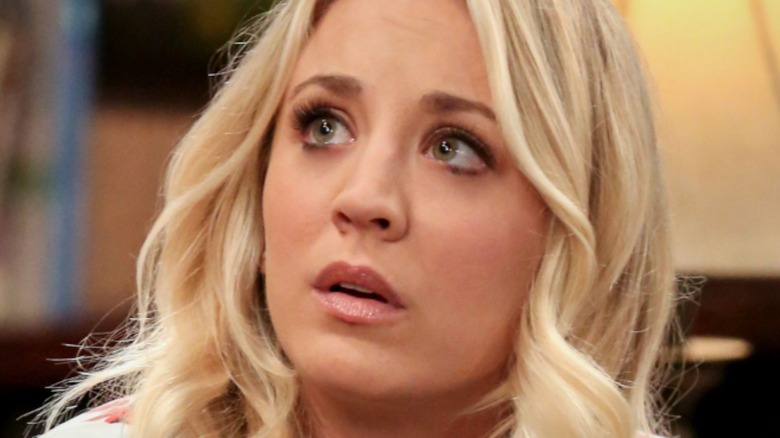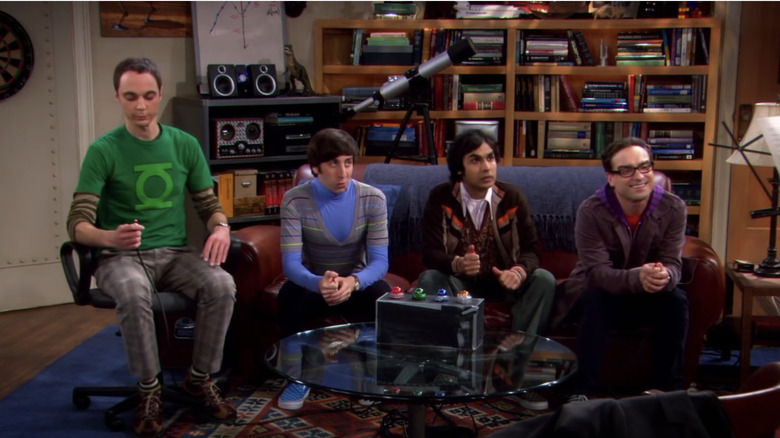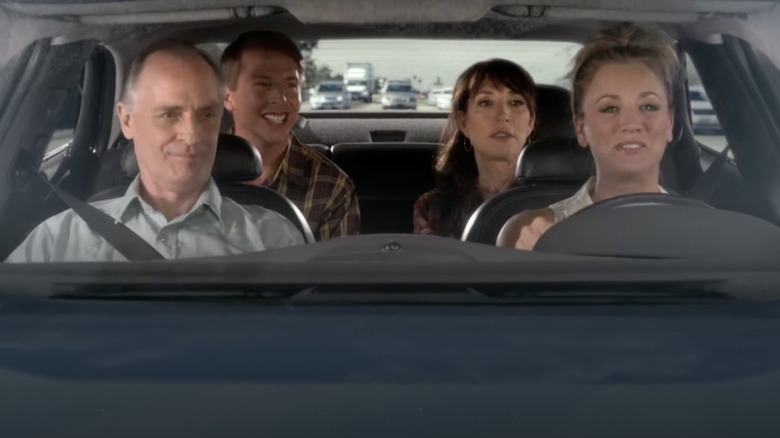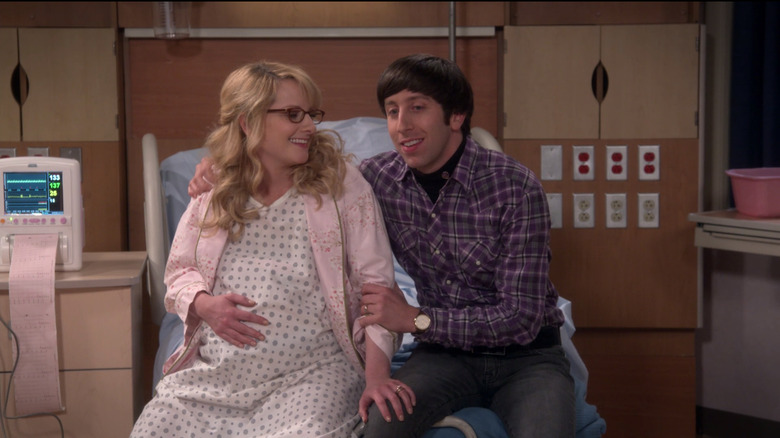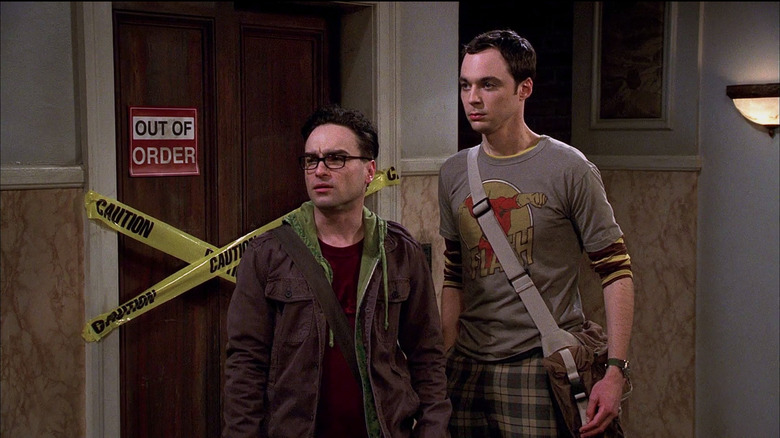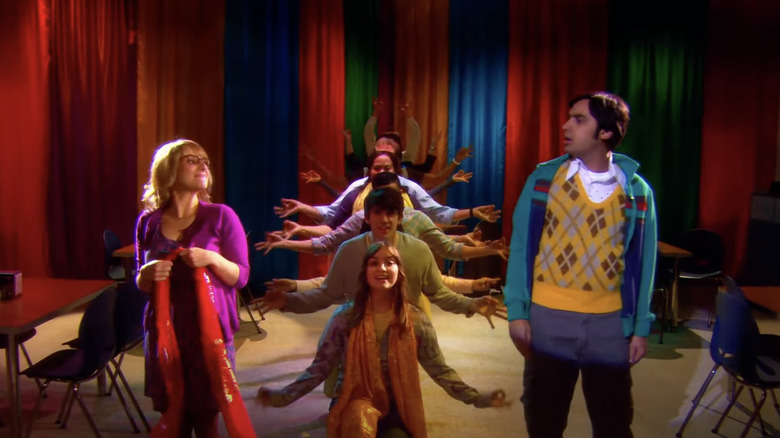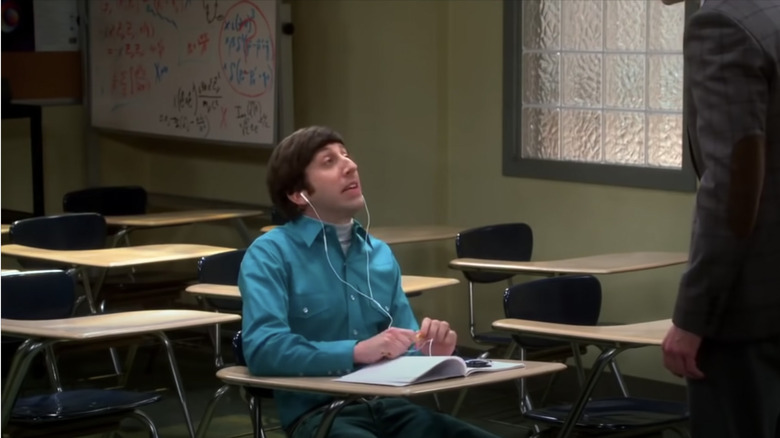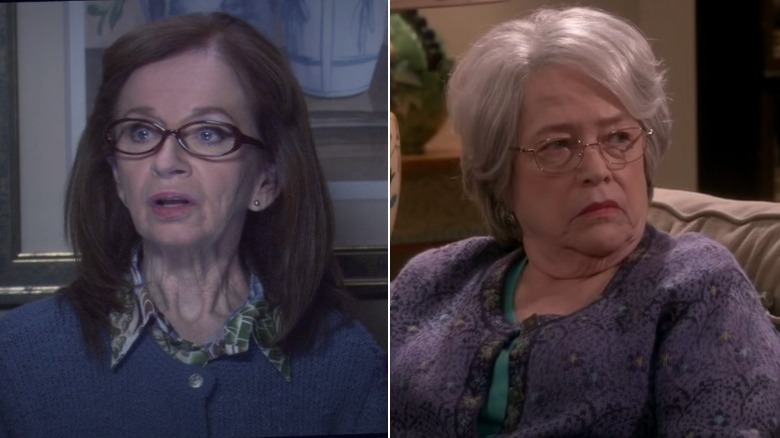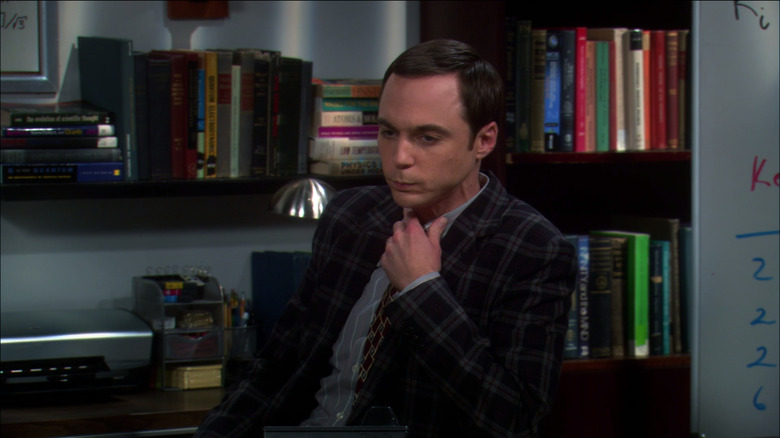The Biggest Plot Holes In The Big Bang Theory
Having broadcast more than 250 episodes over the span of a historic 12-year run, "The Big Bang Theory" holds the esteem of having been the highest-rated television show of its time as well as receiving nominations for several awards, including 50 nominations and 10 wins at the Emmys. The show follows a close-knit quartet of academically gifted (but socially inept) scientists — Sheldon (Jim Parsons), Leonard (Johnny Galecki), Raj (Kunal Nayyar), and Howard (Simon Helberg) — as they awkwardly try to interact and engage with a socially-demanding world.
The creators and showrunners had strived to maintain scientific accuracy by having consultants from their respective fields who'd make sure that every quip, joke, and science reference made by the characters would be factually correct. Not only did the show's wit and humor appeal the general audience, but it managed to entertain those with science and medical backgrounds (via USA Today).
However, after so many years of creating new stories, it becomes quite a task for the writers to keep track of everything they've established about the characters, their quirks, and their backstories. Some of these details would be overlooked and forgotten by the writers, some would be sacrificed to keep the story fresh, and others would be adjusted retroactively to fit the ongoing storyline. It's time to don our lab coats and look into certain story gaps and inconsistencies that may have escaped the scrutiny of even the biggest "Big Bang Theory" fans.
Sheldon's spot
Some of the most recognizable hangout spots in television history are Central Perk's orange couch on "Friends," the table at MacLaren's Pub on "How I Met Your Mother," and the sofa in Leonard and Sheldon's apartment on "The Big Bang Theory." Much like how the orange couch in Central Perk is seemingly reserved for the six "Friends" and the "Main Five" of "How I Met Your Mother" have unofficial dibs on the central table at MacLaren's Pub, Sheldon has placed a particular spot on his the apartment's sofa in a "state of eternal dibs."
Sheldon is shown to have little to no patience for anyone who sits in his spot –- whether on purpose or by accident –- and has openly admitted that his feelings for the spot are even stronger than his love for his mother. His partiality towards this particular spot isn't specific to the sofa itself, as shown in the flashback episode "The Staircase Implementation." Here, we see that only furniture in the living room was a pair of lawn chairs, one of which was -– you guessed it –- Sheldon's spot.
However, there are several instances throughout the show when the other characters sit on the spot in Sheldon's presence, and he doesn't seem to mind or even notice it. Given how finicky Sheldon is about the spot, it seems unlikely that he'd be okay with anyone else seated there (other than his beloved grandmother Meemaw), which makes this a possible oversight by the cast and crew.
Where is Penny's sister?
Penny (played by Kaley Cuoco) has occasionally shared tidbits about her quirky family from Omaha, Nebraska, but almost none of them appeared for the majority of the show's run — with the exception of Wyatt, Penny's father. Along with having a brother who "worked at a meth lab," Penny mentions having a sister a few times in the show –- the sister who drunkenly shot her own husband, and on another occasion gave Penny her first bikini wax using melted Crayola.
While Penny's brother Randall and their mother Susan finally appeared for Penny and Leonard's second wedding ceremony in the first episode of Season 10, "The Conjugal Conjecture," her sister was nowhere to be seen. Given that there was no mention of a sister in the episode, it's quite likely that the writers either overlooked the fact that Penny had a sister (whose name, Lisa, wasn't revealed until the final season of the show), or the budget had already been exhausted on the episode's ensemble cast that was appearing for the wedding ceremony.
Bernadette's long pregnancy
Bernadette's pregnancy was revealed in Season 9, Episode 15, "The Valentino Submergence." In the episode, Howard and Bernadette save an unconscious rabbit found in their new hot tub and name it "Valentino Wolowitz Rabbit," after the holiday. We see the couple's parental instincts emerge as the two nurture the rabbit back to health — that is until Howard gets bitten by Valentino and fears that he may have been infected with rabies. After Howard leaves to get himself tested, Bernadette tells Valentino, "We'll find another time to tell him I'm pregnant," drawing loud gasps from the studio audience.
Given that the episode takes place on Valentine's Day in February and that it typically takes two to three weeks after conception for a pregnancy test to show a positive result, it's safe to say that Howard and Bernadette must have conceived sometime in January. Their child, Halley, was finally born in Season 10, Episode 11 ("The Birthday Synchronicity"), which takes place in December. This means that Bernadette's pregnancy lasted 11 months –- two months longer than the typical duration of a pregnancy.
When did the elevator break?
The broken elevator in Sheldon, Leonard, and Penny's building served as a running gag for the entirety of the show's run, allowing the writers to make use of the building's staircases to lengthen character exchanges, either to provide exposition or simply an amusingly awkward banter between any characters who happen to climb the three flights of stairs to 4A and 4B.
It was revealed in Season 3, Episode 22 ("The Staircase Implementation") that the elevator broke as a result of Leonard's failed experiment in 2003 (four years before the show's premiere). However, Leonard tells Howard in Season 1, Episode 14 ("The Nerdvana Annihilation") that the elevator has been broken for two years, since 2005. Howard apparently being present when the elevator broke also complicates the timeline.
It's strange enough that the elevator wasn't fixed for 16 whole years until the series finale in 2019, but what's more puzzling is the fact that Sheldon never seemed to be irritated by the elevator's malfunction -– especially given his tendency to berate the landlord or the building association for trivial problems, like the lunch truck that stood outside the building or when the water supply would occasionally run out.
Does Raj know Hindi?
Though Raj's proficiency in his native language Hindi was never in doubt, in the Season 10 episode "The Cognition Regeneration," Raj admits something that entirely contradicts his character's background. In the episode, Sheldon decides to challenge himself cognitively by performing difficult mental tasks after losing at a multiplayer game with the gang, and begins to worry that he's no longer the wunderkind he once was. Raj suggests Sheldon learn Hindi, and Sheldon surprises him by responding in Hindi that he had learned the language when he was eight years old. Raj admits that he himself never learned Hindi nor does he understand the language.
Raj mentioned several times that he had been born and raised by Hindi-speaking parents in New Delhi, India, a country he complains about being too hot, loud, and overpopulated when faced with the possibility of getting deported in "The Pirate Solution." Raj has also occasionally spoken a few words in Hindi, even singing a lullaby to himself in Hindi when cornered by the chatty Penny in "The Big Bran Hypothesis" and responding "whatever floats your boat" in Hindi to Sheldon's attempt at learning Finnish in "The Psychic Vortex." Though Raj isn't too fond of his country's food and culture, he's shown a fascination with Bollywood movies –- most notably when he has a heated debate with Sheldon about two prominent Bollywood actresses, in "The Bad Fish Paradigm."
How did Howard study at MIT if he never left his mother's house?
There are two facts about Howard Wolowitz that consistently make him the butt of jokes on "The Big Bang Theory": his deeply unhealthy relationship with his mother, and him being the only one in the gang without a Ph.D. Howard, as it turns out, has just a Master's from MIT. However, these two aspects of the character happen to contradict each other when given some thought.
Howard's relationship with his possessive and controlling mother Debbie Wolowitz was often a source of running gags throughout the show. Shown to be a typical "momma's boy," Howard had never moved out of his mother's house in Pasadena, nor could he muster up the courage to do so when asked by his wife Bernadette the season 6 premiere, "The Date Night Variable."
However, Howard holds a Master's degree in engineering from the Massachusetts Institute of Technology, a university located on the other side of the country and a course that takes five years. It's unimaginable to think that Howard could've survived on his own that long, being thousands of miles away from his mother's house -– regardless of whether or not Debbie had allowed him to move to Boston in the first place.
What happened to Amy's mother?
Not only was Amy's mother portrayed by two different actors –- Annie O'Donnell in a brief cameo in Season 4 and Oscar-nominated actress Kathy Bates in a recurring guest role in Seasons 11 and 12 –- but the character came across very differently in her two separate appearances.
In Amy's earlier appearances, her mother was always described as a concerned parent who urged her introverted daughter to venture outside of her comfort zone, even making a deal that required Amy to go on a date once a year. The character played by Annie O'Donnell in Season 4, Episode 5 ("The Desperation Emanation") comes across as kind and pleasant, eager to meet Amy's then-new boyfriend Sheldon. However, Kathy Bates' Mrs. Fowler in seasons 11 and 12 seems to be much more conservative, strict, and an overbearing mother and wife, even expressing her annoyance at Amy living with Sheldon before their marriage.
In an interview with TVLine, showrunner Steve Holland explained the decision to recast Amy's mother. "When we met Amy's mother in Season 4 [played by Annie O'Donnell], it was before Amy had become such a big part of the show," Holland said. "It was a one-off [scene] on Skype. [Annie] did a wonderful job. But when we had the chance to bring [the character] back in a role that could possibly recur [we decided to make a change]. And [series co-creator Chuck Lorre] had a relationship with Kathy Bates after they worked together [on Netflix's 'Disjointed'] and, well, how do you say no to bringing Kathy Bates on?"
Sheldon survived the helium gag
"Helium voice" has always been a common gag in movies and TV shows, a reliable laugh coming from a character inhaling helium to sound like Alvin and the Chipmunks. We won't bog you down with the details of how the science works, but basically, helium is lighter than air, and when one breathes it in and tries to talk, the sound waves travel faster through the lower-density gas, causing one's voice to sound squeaky and high-pitched. As a piece of comedy it's simple, credible in many situations, and occasionally chuckle-worthy — possibly even to the point of becoming a cliché.
In Season 3, Episode 9 ("The Vengeance Formulation"), Sheldon's arch-nemesis Barry Kripke sabotages Sheldon's radio interview on NPR by pumping helium into his office through a nozzle hooked to a hole in the wall, causing Sheldon's voice to sound cartoonishly squeaky on the radio. While this prank makes Leonard, Raj, Howard, and the entire Caltech cafeteria laugh, it's important to note that using helium improperly can be fatal to humans.
Writing for Slate, David Engber explains, "Breathing in pure helium deprives the body of oxygen, as if you were holding your breath ... When the gas [helium] fills your lungs, it creates a diffusion gradient that washes out the oxygen. In other words, each breath of helium you take sucks more oxygen out of your system ... the body's oxygen level can plummet to a hazardous level in a matter of seconds." Given that there was enough helium in Sheldon's office to displace all the oxygen in the room, Sheldon's over-inflated ego wouldn't have been the only thing to have died that day. It's surprising how the writers could've possibly missed or intentionally overlooked this detail, given their dedication to scientific realism in the show.
